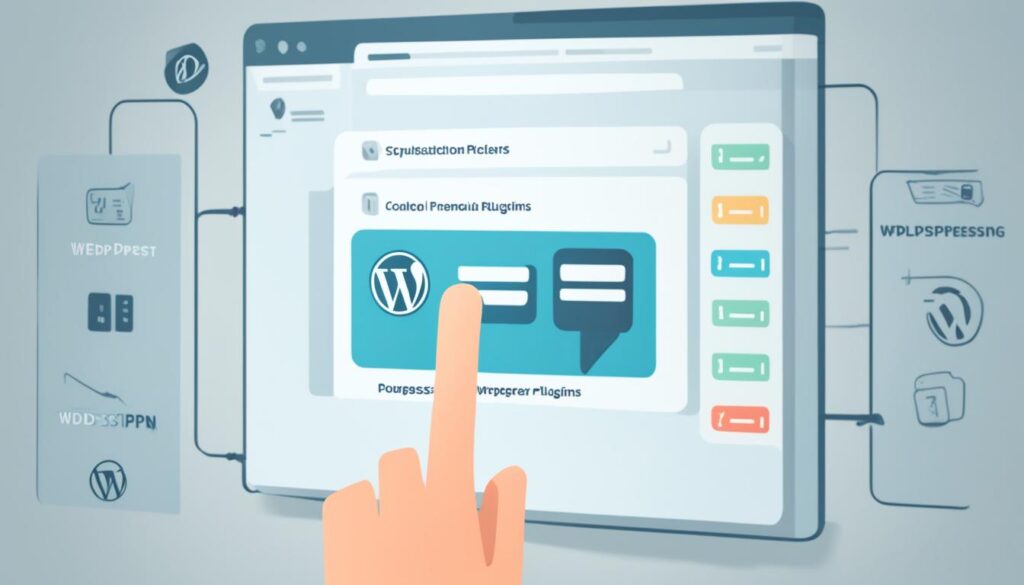Table of Contents
In this comprehensive guide, we will delve into the world of WordPress plugins. You will gain a thorough understanding of what plugins are in WordPress, how they function, and the numerous benefits they offer for enhancing your website’s performance and functionality.
Key Takeaways:
- Plugins in WordPress are add-on software that extend and customize the functionality of your website.
- They offer a wide range of functions, including improving security, integrating social media, optimizing SEO, and more.
- Benefits of WordPress plugins include flexibility, scalability, time-saving, and access to pre-built solutions.
- When choosing plugins, consider factors like ratings, reviews, and developer reputation.
- Installing and managing plugins is a straightforward process, ensuring compatibility and regular updates.
What Are Plugins in WordPress?
To start with, let’s define what plugins are in WordPress. In simple terms, plugins are add-on software that allow you to extend and customize the functionality of your WordPress website. They are designed to seamlessly integrate with the WordPress platform and provide additional features and tools that enhance the user experience, manage content, optimize SEO, and more.
WordPress plugins are like the Swiss Army Knife of website development. They offer a wide range of functionalities that can be added to your WordPress site without the need for extensive coding knowledge. Plugins serve as valuable tools that empower website owners to create a unique and tailored online presence, customized to meet their specific needs.
The purpose of WordPress plugins is to enhance and expand the capabilities of your website, allowing you to achieve your desired functionalities and goals. Whether you want to add a contact form, implement a membership system, optimize your site for search engines, or integrate social media sharing buttons, there’s a plugin available for almost any requirement or idea you may have.
Plugins provide a cost-effective and efficient way to add new features and functionalities to your WordPress site, saving you time, effort, and money by eliminating the need for custom development.
In addition to their flexibility and convenience, WordPress plugins also empower website owners to stay up-to-date with the ever-evolving digital landscape. With regular updates and new plugins being developed and released, you can keep your website at the forefront of technology and ensure it remains competitive in the online space.
Now that we’ve explored the definition and purpose of WordPress plugins, let’s move on to the various functions and examples of these powerful tools.
Example WordPress Plugins
| Plugin Name | Functionality |
|---|---|
| Yoast SEO | Optimizes websites for search engines, improving SEO performance. |
| WooCommerce | Transforms WordPress into a robust e-commerce platform, enabling online selling. |
| Contact Form 7 | Creates and manages customizable contact forms, making it easy for visitors to get in touch. |
| Jetpack | Offers a suite of powerful tools for website management, including security, performance optimization, and analytics. |
Functions of WordPress Plugins
WordPress plugins offer a wide range of functions that cater to various needs and requirements, allowing you to customize your WordPress site according to your specific goals. These plugins enhance your website’s security, performance, and functionality, while also providing advanced features that streamline important processes. Let’s explore some popular functions and examples of WordPress plugins:
1. Website Security
Keeping your website secure is paramount in today’s digital landscape. WordPress plugins like Wordfence Security and Sucuri Security provide robust security features that protect your site from malicious attacks and hackers, ensuring a safe browsing experience for your audience.
2. Performance Optimization
Optimizing your website’s performance is essential for delivering a seamless user experience. Plugins like WP Rocket and WP Super Cache improve page loading times by caching and compressing your site’s files, resulting in faster load times and improved search engine rankings.
3. Social Media Integration
Integrating social media into your website helps increase engagement and reach a broader audience. Plugins such as Jetpack and Easy Social Share Buttons allow you to easily display social media icons, share buttons, and even automate the posting of your website’s content to social media platforms.
4. E-commerce Capabilities
For online businesses, e-commerce plugins are essential to facilitate smooth transactions and manage products effectively. WooCommerce, an immensely popular e-commerce plugin, provides a comprehensive suite of features, including product management, shopping cart functionality, secure payment gateways, and order tracking.
5. Contact Forms
Creating user-friendly contact forms is crucial for connecting with your audience and gathering valuable information. Plugins such as Contact Form 7 and Gravity Forms allow you to effortlessly create and customize professional-looking contact forms, ensuring easy communication with your site visitors.
6. SEO Optimization
Optimizing your website for search engines is vital for increasing visibility and attracting organic traffic. WordPress SEO plugins, like Yoast SEO and All in One SEO Pack, provide valuable tools to optimize your content, meta tags, and URLs, ensuring your website ranks higher in search engine results.
| Function | Popular WordPress Plugins |
|---|---|
| Website Security | Wordfence Security |
| Sucuri Security | |
| Performance Optimization | WP Rocket |
| WP Super Cache | |
| Social Media Integration | Jetpack |
| Easy Social Share Buttons | |
| E-commerce Capabilities | WooCommerce |
| Contact Forms | Contact Form 7 |
| Gravity Forms | |
| SEO Optimization | Yoast SEO |
| All in One SEO Pack |
Benefits of WordPress Plugins
Incorporating plugins into your WordPress website can bring a range of benefits. They offer flexibility and scalability, allowing you to adapt your site’s functionality as your needs evolve. Plugins also save time and effort by providing pre-built solutions for complex tasks. With a vast plugin repository, you have access to a wide range of features and functionalities without needing to code or develop them from scratch.
Let’s dive deeper into the advantages of WordPress plugins:
Enhanced Functionality and Customization
WordPress plugins empower you to extend the core capabilities of your website, adding new features and enhancing existing ones. Whether you require advanced e-commerce functionality, social media integration, or enhanced SEO optimization, plugins offer a wide array of options to meet your specific requirements. With the ability to customize plugin settings, you can tailor your website to suit your unique business needs.
Time and Effort-Saving Solutions
Plugins provide ready-made solutions for complex tasks, eliminating the need for extensive coding or development work. Instead of spending hours or days building functionalities from scratch, you can leverage plugins that offer pre-built features and functionalities. This saves valuable time and allows you to focus on other important aspects of managing and growing your website.
Reduced Development Costs
Hiring professional developers to build custom functionalities for your website can be costly. However, with the wide availability of WordPress plugins, you can achieve the same desired results at a fraction of the cost. Many plugins offer free or affordable options, making it accessible to businesses of all sizes. By utilizing plugins, you can significantly reduce your development expenses and allocate your budget to other critical areas.
Improved User Experience
A positive user experience is essential for the success of any website. WordPress plugins enable you to enhance the user journey and engagement by adding intuitive navigation menus, responsive design elements, and interactive features. Whether it’s integrating a live chat function or optimizing your site for mobile responsiveness, plugins play a vital role in creating a seamless and enjoyable browsing experience for your visitors.
Enhanced Website Performance
Plugins offer numerous tools and functionalities to optimize and improve your website’s performance. From caching plugins that speed up page load times to image optimization plugins that reduce file sizes without compromising quality, these tools can significantly enhance your website’s performance and responsiveness. By implementing performance-driven plugins, you can ensure a smooth browsing experience for your visitors, ultimately leading to higher engagement and conversion rates.
Expanded Marketing and SEO Capabilities
WordPress plugins provide access to advanced marketing and SEO tools that can help boost your website’s visibility and reach. From SEO optimization plugins that provide recommendations to improve your content’s search engine rankings to analytics plugins that track website traffic and user behavior, these plugins empower you to implement effective marketing strategies and measure their impact. With these tools at your disposal, you can optimize your website for higher organic search rankings and drive targeted traffic to your site.
In conclusion, WordPress plugins offer countless advantages for website owners, enabling them to enhance functionality, save time and effort, reduce costs, improve user experience, optimize performance, and expand marketing capabilities. These plugins serve as invaluable tools in unlocking the full potential of your WordPress website and ensuring its success in today’s digital landscape.
Choosing the Right WordPress Plugins
When it comes to optimizing your website’s performance and ensuring compatibility, selecting the right WordPress plugins is crucial. With a plethora of options available, it can be overwhelming to determine which plugins will best meet your specific requirements and align with your website goals. To simplify this process, there are a few key considerations to keep in mind.
Factors to Consider when Selecting WordPress Plugins
1. Plugin Ratings and Reviews: Before choosing a plugin, it’s essential to assess its reputation. Take the time to read reviews and check ratings to gauge its overall quality and user satisfaction. Look for plugins that have a high rating and positive reviews from trusted sources.
2. Update Frequency: Regular updates and maintenance are crucial for ensuring the compatibility and security of your website. Check the update frequency of the plugins you’re considering. Plugins that receive frequent updates are more likely to remain compatible with the latest version of WordPress and offer better support.
3. Developer Reputation: It’s important to consider the reputation and credibility of the plugin developer. Research their track record and check if they have a strong history of developing reliable and well-supported plugins. Look for established developers who are actively involved in the WordPress community.
4. Compatibility with Your WordPress Version: Ensure that the plugin you choose is compatible with the version of WordPress you are using. Plugins that are not regularly updated may not work optimally with the latest WordPress updates and may have security vulnerabilities.
5. Plugin Support: Consider the level of support provided by the plugin developer. Look for plugins that offer responsive customer support and have an active community forum where users can ask questions and find solutions to common issues.
“By carefully considering these factors, you can narrow down your choices and select WordPress plugins that are reliable, well-supported, and compatible with your website.”

| Plugin | Rating | Update Frequency | Developer Reputation |
|---|---|---|---|
| Plugin A | 4.5/5 | Weekly | Highly regarded |
| Plugin B | 4.2/5 | Monthly | Established developer |
| Plugin C | 3.9/5 | Quarterly | Mixed reviews |
Table: Plugin Comparison
Take advantage of tables like the one above to compare plugins systematically and make informed decisions. Consider the plugin’s overall rating, the frequency of updates, and the reputation of the developer to ensure that you choose the best plugin for your specific needs.
Installing and Managing WordPress Plugins
Installing and managing WordPress plugins is a straightforward process that allows you to add new features and enhance the functionality of your website. In this section, we will guide you through the step-by-step instructions on how to install plugins from both the WordPress plugin repository and third-party sources. We will also cover essential tips for effectively managing plugins, including updating, deactivating, and uninstalling them.
How to Install WordPress Plugins
- Access your WordPress dashboard and navigate to the “Plugins” section.
- Click on “Add New” to browse the collection of plugins available in the WordPress plugin repository.
- Use the search bar to find a specific plugin, or explore different categories and featured plugins to discover new ones.
- Once you find a plugin that suits your needs, click on the “Install Now” button.
- After the installation is complete, click on the “Activate” button to activate the plugin on your website.
- If you have a plugin from a third-party source, you can install it by clicking on the “Upload Plugin” button. Select the plugin file from your computer and follow the same activation process.
It’s important to note that when installing plugins, choose reputable sources and read user reviews to ensure compatibility and security.
Managing Plugins in WordPress
Properly managing your plugins is essential to maintain the performance and security of your website. Here are some tips to keep in mind:
- Updating: Regularly update your plugins to ensure they are compatible with the latest version of WordPress and to access new features and security patches. You can update plugins individually or in bulk from the “Plugins” section in your WordPress dashboard.
- Deactivating: If you encounter any conflicts or performance issues on your website, consider deactivating plugins one by one to identify the source of the problem. Deactivated plugins will retain their settings and data, making it easy to reactivate them if needed.
- Uninstalling: If you no longer need a plugin, it’s recommended to uninstall it from your WordPress dashboard. Uninstalling removes the plugin’s files, data, and settings from your website, reducing clutter and potential security risks.
By following these best practices for installing and managing WordPress plugins, you can optimize the functionality of your website and ensure a smooth user experience.
Conclusion
In conclusion, understanding the power and functionality of WordPress plugins is crucial for maximising the potential of your website. By selecting and implementing the right plugins, you can enhance the user experience, streamline website management tasks, and unlock a whole new level of possibilities.
WordPress plugins offer endless opportunities for improving your website’s performance and functionality. Whether you need to add e-commerce capabilities, improve SEO, integrate social media, or optimize your website’s security, there’s a plugin available to meet your specific requirements.
Take the time to explore the vast plugin repository and choose plugins that align with your website’s goals. Consider factors such as ratings, reviews, and developer reputation to ensure compatibility and reliability. With the right plugins in place, you’ll be able to confidently manage your website and create an exceptional online presence.
FAQ
What are WordPress plugins?
WordPress plugins are add-on software that allow you to extend and customize the functionality of your WordPress website. They seamlessly integrate with the WordPress platform, providing additional features and tools to enhance the user experience, manage content, optimize SEO, and more.
What is the purpose of WordPress plugins?
The purpose of WordPress plugins is to enhance and customize the functionality of your WordPress website. They offer a wide range of features and tools, catering to various needs and requirements, such as improving website security, performance, social media integration, e-commerce capabilities, contact forms, and SEO optimization.
What are some popular functions of WordPress plugins?
WordPress plugins serve a multitude of functions, depending on your specific needs. Some popular functions include improving website security, enhancing performance, adding social media integration, e-commerce capabilities, contact forms, SEO optimization, and many more.
What are the benefits of using WordPress plugins?
Incorporating plugins into your WordPress website offers numerous benefits. They provide flexibility and scalability, allowing you to adapt your site’s functionality as your needs evolve. Plugins also save time and effort by providing pre-built solutions for complex tasks. With a vast plugin repository, you have access to a wide range of features and functionalities without needing to code or develop them from scratch.
How do I choose the right WordPress plugins?
Choosing the right WordPress plugins can be overwhelming due to the abundance of options. Consider factors such as plugin ratings, reviews, update frequency, and developer reputation. These considerations will help you select plugins that meet your specific requirements and align with your website goals.
How do I install and manage WordPress plugins?
Installing and managing WordPress plugins is a straightforward process. You can install plugins from the WordPress plugin repository or third-party sources. We provide step-by-step instructions on how to install plugins and offer essential tips for effectively managing them, including updating, deactivating, and uninstalling when necessary.







